Actor Stratford Johns dies
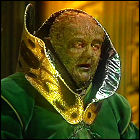 Actor Stratford Johns, a familiar face to British TV audiences for more than four decades, dies at the age of 76. Among his notable genre appearances were Peter Davison’s second Doctor Who story, Four To Doomsday, and one of the final Blake’s 7 episodes, Games; Mr. Johns also appeared in such staples of BBC-TV’s golden era as Z Cars and Softly Softly.
Actor Stratford Johns, a familiar face to British TV audiences for more than four decades, dies at the age of 76. Among his notable genre appearances were Peter Davison’s second Doctor Who story, Four To Doomsday, and one of the final Blake’s 7 episodes, Games; Mr. Johns also appeared in such staples of BBC-TV’s golden era as Z Cars and Softly Softly.
George Harrison, Beatle, dies
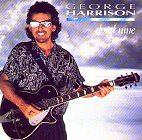 The “Quiet Beatle,” George Harrison, succumbs after a long battle with cancer at the age of 58. Renowned for writing numerous Beatles hits including “Something” and “Here Comes The Sun”, Harrison was also the first to launch a solo career by releasing the triple album All Things Must Pass within a year of the group’s split, consisting of numerous songs that hadn’t made the cut with the rest of the Fab Four, which immediately became a best seller. Harrison also founded Handmade Films to help his friends in the Monty Python troupe complete production of the controversial Biblical spoof Monty Python’s Life Of Brian (which had met with major studio opposition due to its subject matter); Handmade Films later turned out Time Bandits and other cult classics under Harrison’s guidance. At the time of his death, Harrison was said to be working on a new solo album.
The “Quiet Beatle,” George Harrison, succumbs after a long battle with cancer at the age of 58. Renowned for writing numerous Beatles hits including “Something” and “Here Comes The Sun”, Harrison was also the first to launch a solo career by releasing the triple album All Things Must Pass within a year of the group’s split, consisting of numerous songs that hadn’t made the cut with the rest of the Fab Four, which immediately became a best seller. Harrison also founded Handmade Films to help his friends in the Monty Python troupe complete production of the controversial Biblical spoof Monty Python’s Life Of Brian (which had met with major studio opposition due to its subject matter); Handmade Films later turned out Time Bandits and other cult classics under Harrison’s guidance. At the time of his death, Harrison was said to be working on a new solo album.
Mary Whitehouse, media activist, dies
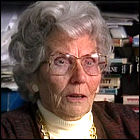 Mary Whitehouse, known for many years for her insistent outcries against sex and violence on British television – including a years-long war of words with various producers of BBC-TV’s Doctor Who – dies at the age of 91 (coincidentally, on the 38th anniversary of Doctor Who’s first broadcast). Many a Who producer has quietly echoed the thoughts of John Nathan-Turner, who has been known to say that he’d pray at night that Ms. Whitehouse would protest loudly about a recent episode of the show because it would draw public attention (and maybe ratings). Ms. Whitehouse is survived by three sons.
Mary Whitehouse, known for many years for her insistent outcries against sex and violence on British television – including a years-long war of words with various producers of BBC-TV’s Doctor Who – dies at the age of 91 (coincidentally, on the 38th anniversary of Doctor Who’s first broadcast). Many a Who producer has quietly echoed the thoughts of John Nathan-Turner, who has been known to say that he’d pray at night that Ms. Whitehouse would protest loudly about a recent episode of the show because it would draw public attention (and maybe ratings). Ms. Whitehouse is survived by three sons.
Delia Derbyshire, music pioneer, dies
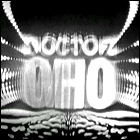 British composer and musician Delia Derbyshire, probably best known for the unforgettably haunting arrangement of Ron Grainer’s Doctor Who theme music which graced the show from 1963 to 1980, dies at the age of 64. The first female composer to work in the BBC Radiophonic Workshop, Ms. Derbyshire also contributed a great deal of music both otherworldly and otherwise to the BBC’s library over the years, and remained an active participant up until her death.
British composer and musician Delia Derbyshire, probably best known for the unforgettably haunting arrangement of Ron Grainer’s Doctor Who theme music which graced the show from 1963 to 1980, dies at the age of 64. The first female composer to work in the BBC Radiophonic Workshop, Ms. Derbyshire also contributed a great deal of music both otherworldly and otherwise to the BBC’s library over the years, and remained an active participant up until her death.
Douglas Adams, writer, dies
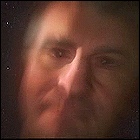 Douglas Adams, the creator of the insanely popular (and maniacally funny) Hitchhiker’s Guide To The Galaxy franchise – spanning two seasons of BBC radio series, five novels, a game and a brief TV series – dies suddenly of a heart attack in his California home at the age of 49. Adams created the Guide in 1978 as a radio series, and the subsequent “trilogy” of five books sold over 14 million copies worldwide. Recently, Adams had been working on H2G2, a cyberspace version of the Guide (to which visitors could add their own entries), as well as collaborating with Austin Powers director Jay Roach on an upcoming movie version of the story. Mr. Adams is survived by his wife Jane and a six-year-old daughter.
Douglas Adams, the creator of the insanely popular (and maniacally funny) Hitchhiker’s Guide To The Galaxy franchise – spanning two seasons of BBC radio series, five novels, a game and a brief TV series – dies suddenly of a heart attack in his California home at the age of 49. Adams created the Guide in 1978 as a radio series, and the subsequent “trilogy” of five books sold over 14 million copies worldwide. Recently, Adams had been working on H2G2, a cyberspace version of the Guide (to which visitors could add their own entries), as well as collaborating with Austin Powers director Jay Roach on an upcoming movie version of the story. Mr. Adams is survived by his wife Jane and a six-year-old daughter.
David Graf, actor, dies
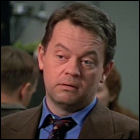 Actor David Graf, forever known as Sergeant Tackleberry in the Police Academy series of films, dies of a heart attack at the age of 50. Graf made a number of guest appearances on TV series near and dear to SF fans, perhaps most notably in the role of aviator Fred Noonan in the original season finale of Star Trek: Voyager’s first season, The 37s (which was later relocated to the show’s second season by UPN). Mr. Graf also guest starred on Star Trek: Deep Space Nine, Quantum Leap, Lois & Clark and Beauty And The Beast, as well as appearing alongside ex-DS9er Terry Farrell in some recent episodes of Becker, a recurring role in The West Wing, and providing character voices for the Star Trek: Voyager Elite Force video game.
Actor David Graf, forever known as Sergeant Tackleberry in the Police Academy series of films, dies of a heart attack at the age of 50. Graf made a number of guest appearances on TV series near and dear to SF fans, perhaps most notably in the role of aviator Fred Noonan in the original season finale of Star Trek: Voyager’s first season, The 37s (which was later relocated to the show’s second season by UPN). Mr. Graf also guest starred on Star Trek: Deep Space Nine, Quantum Leap, Lois & Clark and Beauty And The Beast, as well as appearing alongside ex-DS9er Terry Farrell in some recent episodes of Becker, a recurring role in The West Wing, and providing character voices for the Star Trek: Voyager Elite Force video game.
Ray Walston, actor, dies
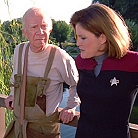 Actor Ray Walston, best known for his starring role as My Favorite Martian but also famous for recurring roles on Picket Fences and both Star Trek: The Next Generation and Star Trek: Voyager, dies at the age of 86. His appearances on Picket Fences earned him two successive supporting actor Emmy awards in 1995 and 1996. Walston also made countless appearances in other television shows, ranging from both the theatrical version and the short-lived TV spinoff of Fast Times At Ridgemont High, to the miniseries based on Stephen King’s The Stand, episodes of Buck Rogers, Mission: Impossible, Amazing Stories, Night Court, Friday The 13th: The Series, Ally McBeal, and Touched By An Angel, and even a one-off attempt to revive ALF.
Actor Ray Walston, best known for his starring role as My Favorite Martian but also famous for recurring roles on Picket Fences and both Star Trek: The Next Generation and Star Trek: Voyager, dies at the age of 86. His appearances on Picket Fences earned him two successive supporting actor Emmy awards in 1995 and 1996. Walston also made countless appearances in other television shows, ranging from both the theatrical version and the short-lived TV spinoff of Fast Times At Ridgemont High, to the miniseries based on Stephen King’s The Stand, episodes of Buck Rogers, Mission: Impossible, Amazing Stories, Night Court, Friday The 13th: The Series, Ally McBeal, and Touched By An Angel, and even a one-off attempt to revive ALF.
Sir Alec Guinness, Star Wars actor, dies
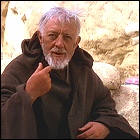 Sir Alec Guinness, best known to SF fans as Obi-Wan Kenobi, dies at the age of 86. He was a working actor for over six decades, though directors had to beg him into participating in his two best-known outings – Star Wars and The Bridge Over The River Kwai; indeed, in recent years, he has made his disdain for the former project very well known to any fans who dared to ask. Reports around the time of his death indicated that Sir Alec Guinness has been suffering from liver cancer. He is survived by his wife and son.
Sir Alec Guinness, best known to SF fans as Obi-Wan Kenobi, dies at the age of 86. He was a working actor for over six decades, though directors had to beg him into participating in his two best-known outings – Star Wars and The Bridge Over The River Kwai; indeed, in recent years, he has made his disdain for the former project very well known to any fans who dared to ask. Reports around the time of his death indicated that Sir Alec Guinness has been suffering from liver cancer. He is survived by his wife and son.
John Colicos, Battlestar Galactica actor, dies
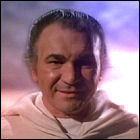 Canadian-born actor John Colicos, known for numerous genre roles among his countless TV appearances, dies at the age of 71. In the original Star Trek, he was the first actor to be seen portraying a Klingon, in the 1967 episode Errand Of Mercy, and would later reprise the role in two episodes of the 1990s spinoff Star Trek: Deep Space Nine. In the late 1970s, he had a recurring role as Count Baltar, the chief human antagonist in the original Battlestar Galactica.
Canadian-born actor John Colicos, known for numerous genre roles among his countless TV appearances, dies at the age of 71. In the original Star Trek, he was the first actor to be seen portraying a Klingon, in the 1967 episode Errand Of Mercy, and would later reprise the role in two episodes of the 1990s spinoff Star Trek: Deep Space Nine. In the late 1970s, he had a recurring role as Count Baltar, the chief human antagonist in the original Battlestar Galactica.
DeForest Kelley, actor, dies
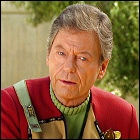 Actor DeForest Kelley, loved around the world for his portrayal of cranky-but-sympathetic Doctor Leonard “Bones” McCoy on Star Trek, dies at the age of 79 from cancer. A mainstay of western movies and TV guest roles since the 1940s, Kelley had first encountered Gene Roddenberry while auditioning for the lead role in his detective series pilot called Sam Benedict – a role which Kelley didn’t win, but he made enough of an impression that Roddenberry invited him to view the first two Star Trek pilots when recasting the Enterprise’s doctor for a third time. Kelley’s most recent appearance in the role had been in 1991’s Star Trek VI: The Undiscovered Country; he declined to take part in 1994’s Star Trek: Generations, though a role had been written for him. (He had already handed the baton off to The Next Generation in an unannounced cameo appearance in that series’ pilot.)
Actor DeForest Kelley, loved around the world for his portrayal of cranky-but-sympathetic Doctor Leonard “Bones” McCoy on Star Trek, dies at the age of 79 from cancer. A mainstay of western movies and TV guest roles since the 1940s, Kelley had first encountered Gene Roddenberry while auditioning for the lead role in his detective series pilot called Sam Benedict – a role which Kelley didn’t win, but he made enough of an impression that Roddenberry invited him to view the first two Star Trek pilots when recasting the Enterprise’s doctor for a third time. Kelley’s most recent appearance in the role had been in 1991’s Star Trek VI: The Undiscovered Country; he declined to take part in 1994’s Star Trek: Generations, though a role had been written for him. (He had already handed the baton off to The Next Generation in an unannounced cameo appearance in that series’ pilot.)
Terry Nation, Dalek creator, dies
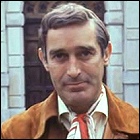 Welsh-born writer Terry Nation, who wrote the first Doctor Who scripts featuring the Daleks, dies at the age of 66. A former comedy writer, Nation had recently been fired from a steady comedy job when his agent directed him toward the still-in-development BBC science fiction series; Nation’s first script drew the ire of Doctor Who creator Sydney Newman, who issued his famous “no bug-eyed monsters” edict in response, though Nation’s scripts were bought and filmed by the show’s first producer, Verity Lambert. The Daleks immediately secured the future of both Doctor Who and Nation himself, who went on to create seminal BBC genre series such as Survivors and Blake’s 7 before emigrating to America, where he became a producer on MacGyver. At the time of his death, he had been developing concepts for a Blake’s 7 revival with input from series star Paul Darrow.
Welsh-born writer Terry Nation, who wrote the first Doctor Who scripts featuring the Daleks, dies at the age of 66. A former comedy writer, Nation had recently been fired from a steady comedy job when his agent directed him toward the still-in-development BBC science fiction series; Nation’s first script drew the ire of Doctor Who creator Sydney Newman, who issued his famous “no bug-eyed monsters” edict in response, though Nation’s scripts were bought and filmed by the show’s first producer, Verity Lambert. The Daleks immediately secured the future of both Doctor Who and Nation himself, who went on to create seminal BBC genre series such as Survivors and Blake’s 7 before emigrating to America, where he became a producer on MacGyver. At the time of his death, he had been developing concepts for a Blake’s 7 revival with input from series star Paul Darrow.
Gene Roddenberry, Star Trek creator, dies
 Having been hospitalized for several weeks, Star Trek creator Gene Roddenberry dies in a Los Angeles hospital; his health had been declining in recent years and he had become confined to a wheelchair, leaving much of the day-to-day production duties of Star Trek: The Next Generation executive producers Rick Berman and Michael Piller. Roddenberry is survived by his son and by Majel Barrett Roddenberry, who still occasionally guest stars on Star Trek: TNG as Lwaxana Troi, and fans the world over mourn his passing. Rick Berman is expected to continue assuming full responsibility for the Star Trek franchise’s production and creative decisions, a role he had already been fulfilling during Roddenberry’s recent years of ill health. TNG is currently in its fifth season.
Having been hospitalized for several weeks, Star Trek creator Gene Roddenberry dies in a Los Angeles hospital; his health had been declining in recent years and he had become confined to a wheelchair, leaving much of the day-to-day production duties of Star Trek: The Next Generation executive producers Rick Berman and Michael Piller. Roddenberry is survived by his son and by Majel Barrett Roddenberry, who still occasionally guest stars on Star Trek: TNG as Lwaxana Troi, and fans the world over mourn his passing. Rick Berman is expected to continue assuming full responsibility for the Star Trek franchise’s production and creative decisions, a role he had already been fulfilling during Roddenberry’s recent years of ill health. TNG is currently in its fifth season.
Patrick Troughton, Doctor Who actor, dies
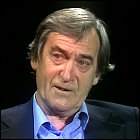 Patrick Troughton, the first actor to inherit the lead role of Doctor Who from another actor (and still one of the best-loved incarnations of the time-traveling Doctor), dies at the age of 67 on the second day of a science fiction convention in Columbus, Georgia. Despite worries about a persistent heart condition (he had already suffered heart attacks in 1978 and 1984), Troughton had made the trip to America against his doctor’s advice, suffering a fatal third heart attack after breakfast. His final TV appearance, the series Knights Of God, will air later in the year, having actually been filmed in 1985.
Patrick Troughton, the first actor to inherit the lead role of Doctor Who from another actor (and still one of the best-loved incarnations of the time-traveling Doctor), dies at the age of 67 on the second day of a science fiction convention in Columbus, Georgia. Despite worries about a persistent heart condition (he had already suffered heart attacks in 1978 and 1984), Troughton had made the trip to America against his doctor’s advice, suffering a fatal third heart attack after breakfast. His final TV appearance, the series Knights Of God, will air later in the year, having actually been filmed in 1985.
Robert Holmes, Doctor Who writer, dies
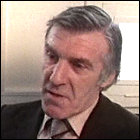 Robert Holmes, considered by many fans to be the definitive script editor and most influential writer of classic Doctor Who, dies at the age of 60. He was responsible for the Sontarans, the Autons, The Master, The Ark In Space, Pyramids Of Mars, and Caves Of Androzani; his scripts for the popular BBC space opera Blake’s 7 were also considered among that show’s best installments. He also bestowed the name Gallifrey upon the planet of the Time Lords and virtually created the entire Time Lord mythology in the acclaimed and controversial 1976 installment The Deadly Assassin. His untimely death cuts short his work on the final installments of The Trial Of A Time Lord and throws the scripting and production of those final two episodes into chaos.
Robert Holmes, considered by many fans to be the definitive script editor and most influential writer of classic Doctor Who, dies at the age of 60. He was responsible for the Sontarans, the Autons, The Master, The Ark In Space, Pyramids Of Mars, and Caves Of Androzani; his scripts for the popular BBC space opera Blake’s 7 were also considered among that show’s best installments. He also bestowed the name Gallifrey upon the planet of the Time Lords and virtually created the entire Time Lord mythology in the acclaimed and controversial 1976 installment The Deadly Assassin. His untimely death cuts short his work on the final installments of The Trial Of A Time Lord and throws the scripting and production of those final two episodes into chaos.
Rod Serling, Twilight Zone creator, dies
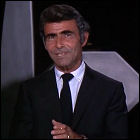 Celebrated writer Rod Serling dies at the age of 50 during a coronary bypass operation. An intelligent, rebellious mind from a young age, Serling developed an interest in writing – particularly for radio drama – before he graduated high school. He had also already developed a keen social consciousness at this age, which, combined with his authority-bucking nature, made his enlistment in the Army during World War II (immediately after graduating high school) an uneasy fit. As an Army paratrooper, Serling fought to liberate the Philippines from Japanese occupation. He was injured in combat and saw many of his comrades wounded or killed along the way, experiences which game him nightmares and informed many of his later works. He began his writing career in earnest after attending college on the G.I. Bill, and as radio gave way to television, he was at the forefront of the new profession of TV writing, with two scripts for anthology series – Patterns for Kraft Television Theatre and Requiem For A Heavyweight for Playhouse 90 – serving as career turning points. With corporate sponsors holding enormous sway over TV content in those days, Serling quickly found himself railing against the interference and outright censorship that resulted. Another anthology script, The Time Element, was intended as a pilot for an anthology Serling pitched to CBS, but was instead produced as an episode of Westinghouse Desilu Playhouse; it proved popular enough to get The Twilight Zone greenlit by CBS. Serling often used science fiction and supernatural settings in his new series to address issues such as racism, fascism, racial inequality, and the futility of war. He famously wrote many script drafts for 1968’s Planet Of The Apes, and returned to the anthology format in 1969 with a new series for NBC, Night Gallery, and, following that series, a radio drama suspense series called The Zero Hour for Mutual Radio.
Celebrated writer Rod Serling dies at the age of 50 during a coronary bypass operation. An intelligent, rebellious mind from a young age, Serling developed an interest in writing – particularly for radio drama – before he graduated high school. He had also already developed a keen social consciousness at this age, which, combined with his authority-bucking nature, made his enlistment in the Army during World War II (immediately after graduating high school) an uneasy fit. As an Army paratrooper, Serling fought to liberate the Philippines from Japanese occupation. He was injured in combat and saw many of his comrades wounded or killed along the way, experiences which game him nightmares and informed many of his later works. He began his writing career in earnest after attending college on the G.I. Bill, and as radio gave way to television, he was at the forefront of the new profession of TV writing, with two scripts for anthology series – Patterns for Kraft Television Theatre and Requiem For A Heavyweight for Playhouse 90 – serving as career turning points. With corporate sponsors holding enormous sway over TV content in those days, Serling quickly found himself railing against the interference and outright censorship that resulted. Another anthology script, The Time Element, was intended as a pilot for an anthology Serling pitched to CBS, but was instead produced as an episode of Westinghouse Desilu Playhouse; it proved popular enough to get The Twilight Zone greenlit by CBS. Serling often used science fiction and supernatural settings in his new series to address issues such as racism, fascism, racial inequality, and the futility of war. He famously wrote many script drafts for 1968’s Planet Of The Apes, and returned to the anthology format in 1969 with a new series for NBC, Night Gallery, and, following that series, a radio drama suspense series called The Zero Hour for Mutual Radio.
Yuri Gagarin, first man in space, dies
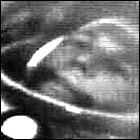 Soviet cosmonaut Yuri Gagarin, the first human space traveler, dies along with a flight instructor in a MiG jet fighter crash. Considered too valuable a publicity asset to risk in another spaceflight, Gagarin had been barred from any further space missions. Several investigations into the fatal crash are conducted, with none of them reaching any definitive conclusions, though unfavorable flying weather and a sudden dive (possibly also a result of the weather) are commonly cited factors. Gagarin’s ashes are buried in the wall of the Kremlin.
Soviet cosmonaut Yuri Gagarin, the first human space traveler, dies along with a flight instructor in a MiG jet fighter crash. Considered too valuable a publicity asset to risk in another spaceflight, Gagarin had been barred from any further space missions. Several investigations into the fatal crash are conducted, with none of them reaching any definitive conclusions, though unfavorable flying weather and a sudden dive (possibly also a result of the weather) are commonly cited factors. Gagarin’s ashes are buried in the wall of the Kremlin.